
A large earnest money deposit can help you win the bid on a home, but what if you can’t get it back? Is it worth risking a large amount of money?
Compare Offers from Several Mortgage Lenders.
Luckily, there are situations where earnest money is refundable. Keep reading to see what situations apply and if it would work for you.
What is an Earnest Money Deposit?
First, let’s look at the meaning of the earnest money deposit. You may also hear it called the ‘good faith deposit.’ This deposit is money you put down with the executed purchase contract. It’s not your down payment, but it will be applied to your down payment at the closing.
The earnest money shows the lender that you are acting in good faith and that you intend to buy the home in question. There isn’t a set amount you must put down; it varies by state law and individual seller. On average, you can expect to put down between 1% and 3% of the purchase price, though.
Who Receives the Earnest Money?
This step is very important. Never give your earnest money directly to the seller. Instead, it should sit in an escrow account with a third party, such as an escrow company or real estate broker. The money sits in the account until you ‘close escrow’ or close on the home purchase.
The earnest money you pay upfront gets deducted from the total down payment. For example, if your total down payment will be $20,000 and you put $5,000 in earnest money, you only need to bring $15,000 to the closing for the down payment. The remainder will come from the earnest money when it’s released.
What if You Don’t Buy the Home?
This is when things get tricky. If you don’t buy the home, technically, the seller can keep the earnest money unless you specified otherwise in the purchase contract.
This is why it’s important to use a real estate lawyer when drawing up a purchase contract. You want to make sure all of your bases are covered. Typically, the contract will have a small window of opportunity for the buyer to back out. If the buyer doesn’t back out before that date, the earnest money is the possession of the seller unless you put contingencies in the contract.
Contingencies are the only way out of a contract with your earnest money in hand. If you back out of the contract for any reason other than what’s stated in the contract under contingencies, the seller has the right to keep your earnest money.
Click to See the Latest Mortgage Rates.
The most common contingencies that allow you to back out of the contract with your earnest money in hand include:
- Financing – If you can’t get a mortgage approval before the expiration of the financing contingency, you can back out of the contract.
- Appraisal – If the appraiser finds that the home is worth less than your agreed upon price, you can back out of the contract. The appraisal must be completed before the expiration of the contingency though.
- Sale of home – If you have a current home you must sell in order to buy the new home, you can add this contingency. If you don’t have an executed contract before the expiration date of the contingency, you can back out of the contract.
- Title – If the title examiner finds existing liens on the property or an issue with the chain of ownership, you can back out of the contract with this contingency in place.
- Home inspection – This contingency allows you time to secure a home inspection and read the report. If the home has major issues, you have the chance to back out of the contract.
The common denominator with each of these contingencies is the expiration date. The contingencies aren’t good forever. You get a specific amount of time, which is usually a couple of weeks, to satisfy the contingency or back out of the contract.
If you back out of the contract for any other reason or outside of the contingency expiration dates, you run the risk of losing your earnest money.
